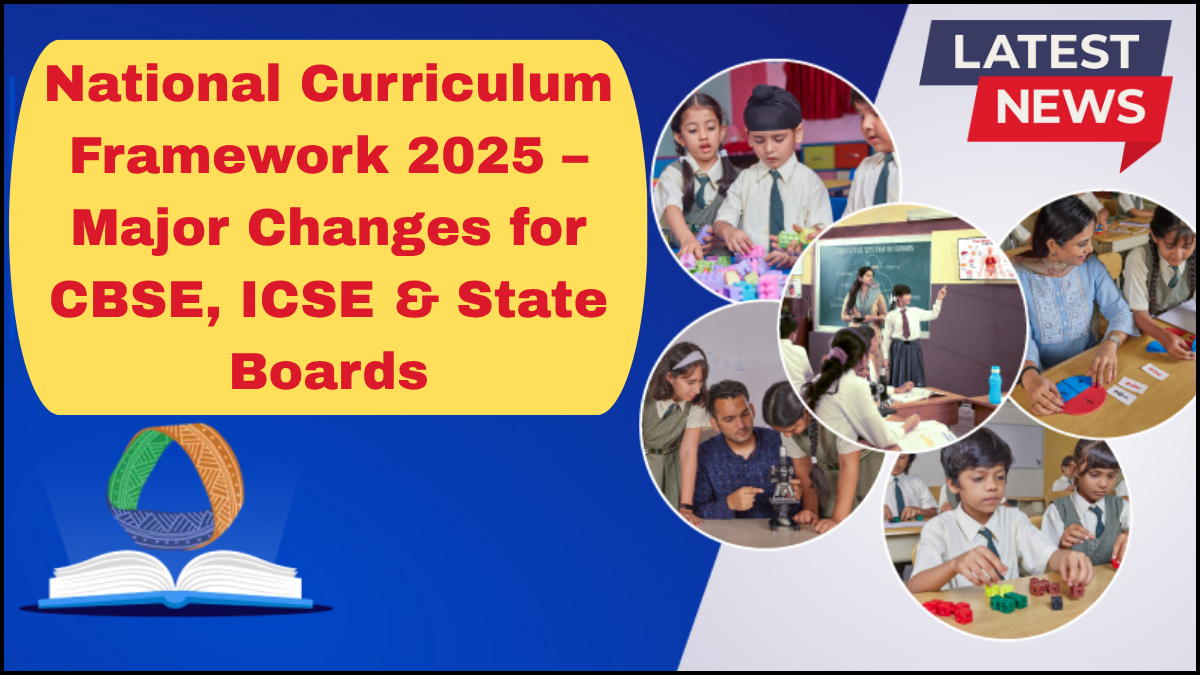The National Curriculum Framework 2025 (NCF 2025) is set to revolutionize Indian education with sweeping changes aligned with the National Education Policy 2020 (NEP 2020). As India moves to modernize learning outcomes and reduce exam-centric pressure, this new framework will significantly impact the CBSE, ICSE, and State Boards alike. It’s not just a curriculum refresh—it’s a structural overhaul.
Here’s a detailed look at the major updates, new structural formats, teaching methods, and implications for students, teachers, and institutions under this National Curriculum Change.

What is the National Curriculum Framework 2025?
The NCF 2025 is a strategic blueprint developed to implement the recommendations of NEP 2020. It sets the guidelines for what students should learn, how they should learn it, and how learning should be assessed at different stages of school education. It spans four stages:
-
Foundational (ages 3–8)
-
Preparatory (ages 8–11)
-
Middle (ages 11–14)
-
Secondary (ages 14–18)
These stages replace the old 10+2 system with a 5+3+3+4 structure, marking a shift from rote memorization to critical thinking, creativity, and real-world skill-building.
Major Curriculum Revisions Across Boards
1. Emphasis on Competency-Based Learning
Under NCF 2025, CBSE, ICSE, and State Boards will transition toward competency-based education, focusing on mastering concepts rather than memorizing facts. For instance, science classes will prioritize experimentation and application over textbook definitions.
This shift ensures students are evaluated based on what they can do with what they know, not just what they remember.
2. Multilingual and Cultural Integration
To promote diversity and inclusiveness, the new curriculum supports mother tongue or regional language instruction up to Grade 5, wherever possible. The framework encourages multilingual classrooms and integrates local culture and context into textbooks.
Boards are expected to adapt their materials to reflect local histories, literature, and knowledge systems without compromising core learning standards.
3. Flexible Subject Combinations
One of the most significant board updates is the removal of rigid subject streams in high school. Students can now mix subjects from different domains—like physics with music or math with art—allowing a customized learning path.
This flexibility empowers students to pursue interests and build interdisciplinary skills, a key goal of NEP 2020.
4. Shift in Assessment Patterns
Traditional exams are being overhauled to reduce stress and encourage formative assessments. NCF 2025 promotes a 360-degree evaluation approach using portfolios, project work, peer reviews, and teacher feedback.
The CBSE board has already begun piloting AI-based adaptive assessments, and ICSE and State Boards are expected to follow suit with tech-driven evaluations.
5. Integration of Vocational Education
By Grade 6, students will be introduced to hands-on vocational subjects such as coding, carpentry, gardening, and financial literacy. This is a leap toward blending academic and practical skills early on.
The curriculum will also include internship opportunities for older students, bridging the gap between school and the job market.
6. Foundational Literacy and Numeracy Focus
The first stage of education now centers heavily on foundational literacy and numeracy. The NCF 2025 outlines a structured method for improving reading comprehension, arithmetic skills, and logical thinking in early years, crucial for long-term academic success.
Implementation Timeline and Challenges
The phased rollout of the National Curriculum Change will begin from the 2025–26 academic session. CBSE and ICSE have started pilot programs in select schools, while State Boards are finalizing localized curriculum adaptations.
However, successful implementation hinges on:
-
Teacher training and capacity-building
-
Infrastructure upgrades
-
Curriculum translation into multiple languages
-
Parental awareness programs
Impact on Stakeholders
-
Students will benefit from less exam pressure, more engaging content, and broader career choices.
-
Teachers will need support in adopting interactive pedagogies and digital tools.
-
Parents will play a greater role in continuous assessment and learning support.
-
Schools must restructure timetables, resources, and teacher roles to fit the new framework.
Conclusion
The National Curriculum Framework 2025 is more than a policy—it’s a vision for a progressive, inclusive, and future-ready education system. Whether you’re in a CBSE school in Delhi, an ICSE school in Mumbai, or a State Board school in Kerala, the changes will touch every aspect of teaching and learning.
With its roots in NEP 2020, the framework promises a well-rounded education model that values knowledge, creativity, and skill equally.
FAQs on NCF 2025 and National Curriculum Change
Q1. When will NCF 2025 be implemented in schools?
The rollout begins in the 2025–26 academic year, with phased adoption across CBSE, ICSE, and State Boards.
Q2. What is the 5+3+3+4 structure?
It represents four stages of schooling: Foundational (5 years), Preparatory (3), Middle (3), and Secondary (4), focusing on age-appropriate learning methods.
Q3. Will exams be removed under NCF 2025?
No, but the focus will shift to formative and competency-based assessments instead of high-stakes, memory-driven exams.
Q4. How does NCF 2025 affect CBSE and ICSE boards?
Both boards will align their curricula to promote flexibility, skill-based learning, and multilingual education, in line with the National Curriculum Change.
Q5. Are vocational subjects mandatory under NCF 2025?
Vocational exposure is encouraged from Grade 6 onward, but boards may offer a range of options for schools to implement based on resources.
click here to learn more